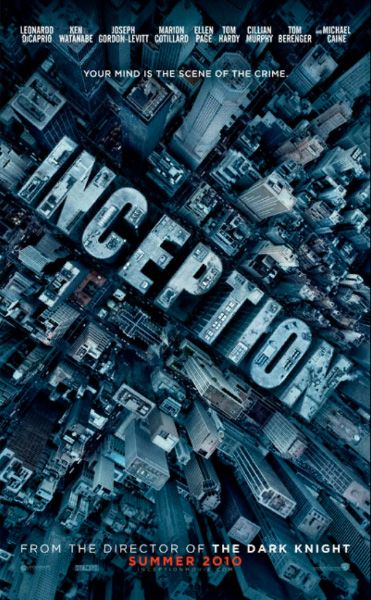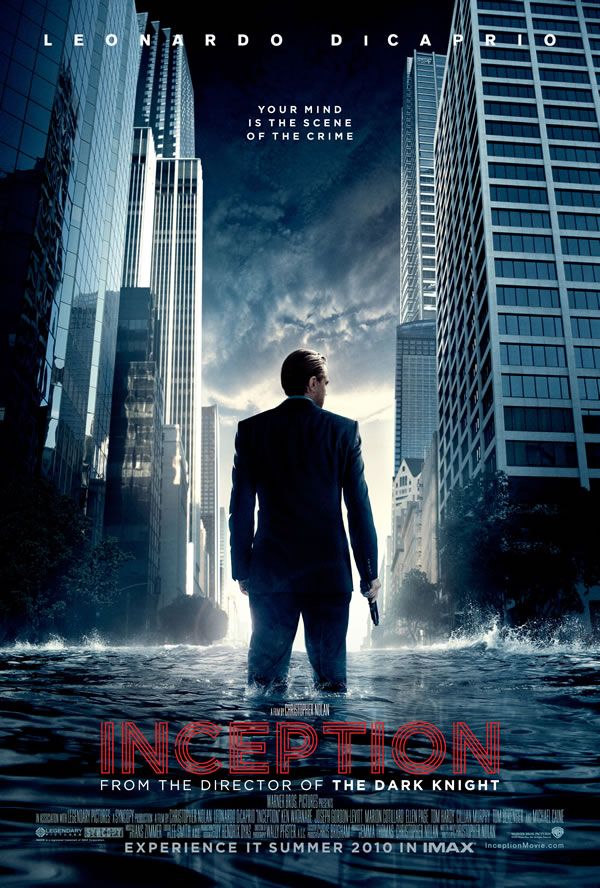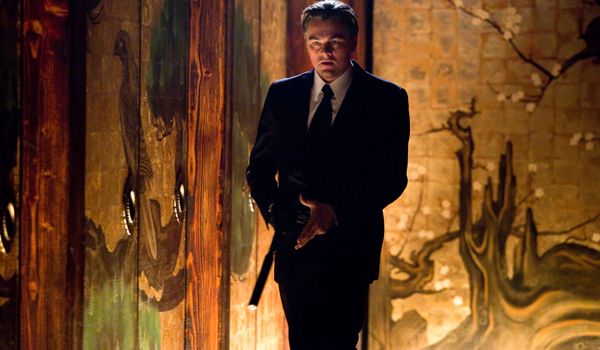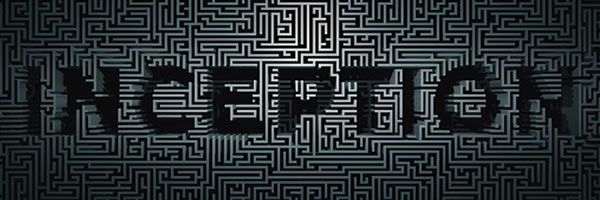At this year's ShoWest in Las Vegas, I got to participate in a roundtable interview with writer/director Christopher Nolan and producer Emma Thomas for their upcoming Warner Bros. movie Inception as a reporter for our partners at Omelete. While Inception has been shrouded in mystery, at ShoWest, Nolan finally unveiled some of the movie to theater owners and I got to see the footage.
While I still don't know that much about Inception, the footage revealed Leonardo DiCaprio plays someone who can go into your dreams and steal information. He also works with others that can do the same thing. Since many of you might not want to know more than that...just know the footage looked incredible and the film is going to be huge. For more than that, here's my full write-up.
Anyway, during the interview Nolan and Thomas talked about trying to keep the film a mystery while still having to promote it. They also talked about where the idea came from, his relationship with Warner Bros., what kind of cameras he shot with (IMAX, anamorphic 35mm, 65mm, and VistaVision), what does he think of 3D, how much does he pre-viz, and so much more. If you're a fan of Chris Nolan, it's a fantastic interview and one you have to read:
As always, you can either read the transcript below or listen to the audio by clicking here.
And one last thing...if you're looking for Batman or Superman info...we didn't discuss it. I'd heard through he just wanted to talk about Inception, and that's what we did. While I might have been tempted to break the rules when talking to someone else...I think Nolan is one of the best filmmakers in the world and I have a tremendous amount of respect for him. If he just wants to talk about his latest film...than that's what I was going to do.
-
Question: I speak for everyone when I say thank you for showing footage today.
Chris Nolan: Oh, thank you for coming and watch it.
Emma Thomas: We think it was time.
Nolan: Time to show something, yeah.
Could you actually talk a little bit about the fact that you have kept the film under such a very mysterious cloak, but yet you do have to talk about it and promote it because the cost of making a movie?
Nolan: Yeah, absolutely. I was saying it in there but I really believe that for me the most gratifying cinematic experiences as a viewer have always been films that I didn't know what to expect. Right from when I first saw "Star Wars" when I was a kid in 1977. My uncle had told me to go see it. He said you'd probably get a kick out of it. But I didn't really know anything about it. And I can remember looking at the poster and looking at the characters and not knowing anything specific about it. And then it just took me on this incredible journey. And I think that films like "Avatar", when you sit down you don't really quite know what to expect. I think that's the most exciting form of movie making. It provides a huge challenge from a marketing point of view because you have to give people enough. You've got to give them a reason to go see the film. So we're really trying to strike a balance between, not sort of shrouding the thing in secrecy or anything like that. It's really just a question of the best explanation of what the inception is watching the film and completely get it and I think hopefully really enjoy it. Talking about it is a little tricky.
Did you have a long conversation with your actors, especially Leonardo, about the concept of the movie which is quite surprising? I mean for you guys to be on the same page as far as dreams and what can...
Nolan: Oh yeah, definitely. Leo primarily because he was the first to come on board. And he's an actor who's absolutely relentless in his demands for authenticity of the character. The truthfulness of what he talks about the underlying truths of the character-emotional truths. The journey that character is on, and so we spent months talking about the script and re-writing the script. I spent a long time re-writing the script to make sure that the emotional journey of his character was the...that's the driving force of the movie. That's the journey the audience is on and he, as a great actor and a great movie star with his charisma and his emotional openness to the audience, he carries the audience through on that journey.
I was curious if you could talk about IMAX and 3D? These are both things that are...you really pioneered what IMAX could do with "Dark Knight" and 3D seems to be a revolution and it's changing everything. Could you talk about your feelings about 3D and also with IMAX, did you shoot any of "Inception" in IMAX or was it all done in post?
Nolan: We shot the film with a mixture of mostly the predominant bulk of the film is anamorphic 35mm, which is the best quality sort of practical format to shoot on by far. We shot key sequences on 65mm, 5 perf not 15 perf, and we shot VistaVision on certain other sequences. So we've got a negative - a set of negative - that's of the highest possible quality except IMAX. We didn't feel that we were going to be able to shoot in IMAX because of the size of the cameras because this film given that it deals with a potentially surreal area, the nature of dreams and so forth, I wanted it to be as realistic as possible. Not be bound by the scale of those IMAX cameras, even though I love the format dearly. So we went to the next best thing which was 65mm. So we have the highest quality image of any film that's being made and that allows us to reformat the film for any distribution form that we'd like to put it in. We're definitely going to do an IMAX release. We're excited about doing that and using our original negative 65mm photography to maximize the effect of that release. 3D I think is an interesting development in movies or the resurgence of 3D. It's something we're looking at and watching. There are certain limitations of shooting in 3D. You have to shoot on video, which I'm not a fan of. I like shooting on film. And so then you're looking at post-conversion processes which are moving forward in very exciting ways. So really, for me, production of a large scale film is all about recording the best, highest quality image possible so that you can then put it in any theatre in the best way possible. And 65mm film, IMAX film, VistaVision, 35mm, that's the way you do that.
I heard that right before I think you mentioned you were working on this for like what 13 years?
Nolan: I mean the script specifically about 10 years. 9 or 10 years. I can't remember exactly.
Why is it because it's so complex or because you had other projects in between?
Nolan: Well, I certainly been a little busy in the meantime, but I think I first pitched it to the studio right after I shot "Insomnia". And they were quite excited about what I was pitching them, but I realized that I wasn't ready to develop it. I wasn't ready to write it at that point. And I think that over the last 10 years it stayed in my head as a concept and as a really exciting sort of narrative structural idea and this sort of heist movie thing that's going on with the film. But I think I didn't know how emotionally to engage with it. I didn't know how to finish the script emotionally in a sense. And I think I sort of grew into the project in a way and then I think Leo coming on board has been really the end of that process for me because with his attention to the emotional life of the character and what that should mean to the audience, I think I finally found that emotional connection with the material that I depend on as a filmmaker, because what I've realized about myself over the years is if I don't engage with something on that level, I'll never sustain my interest in it for the 2 years it takes to make it.
Where did this idea of stealing an idea come from...
Nolan: Well, I stole it. It's a little risky putting yourself out there again stealing ideas, yes. It really came about as a result of...I don't remember specifically where the idea came from except that once I started exploring the idea of people sharing a dream space-entering a dream space and sharing a dream. That gives you the ability to access somebody's subconscious. What would that be used and abused for? That was the jumping off point. And clearly being able to extract information from somebody's brain would be the obvious use of that because obviously any other system where it's computers or physical media whatever, things that exist outside the mind, they can all be stolen...up until this point or up until this movie I should say, the idea that you could actually steal something from somebody's head was impossible. So that, to me, seemed a fascinating abuse or misuse of that kind of technology.
I'm curious if you could talk about producing and producing specifically this project? How is Chris-Mr. Nolan-changed, if you will, over the last few years? If at all.
Thomas: Not much, I'd say. Chris...we met when I was 18 and Chris was 19. And he had already known at that point for I think 10 years that he wanted to direct films. So he's always been a very singular...he's had a singular ambition. And I would say he hasn't changed enormously except that I think you're right when you say you sort of grew into this project. It's like a lot of the things...basically the other films that he's made in the years leading up to this have informed what this film is. We did a lot of the things that we couldn't do with the "Batman" films because of limitations of source material or 1whatever. And we did a lot of things that we had learnt how to do and...does that answer your question? Not terribly well probably.
How much in pre-production are you guys...I mean do you guys figure out anything when you're there on the set or is a lot of it is it all figured out in pre-production and pre-viz and stuff like that?
Thomas: You don't tend to do pre-viz very much but what our approach is is that we tend to prepare for any eventuality so that Chris then and the actors then have on-set the freedom to, you know, improvise to a degree.
Nolan: Yeah, you try to have a plan and a framework for scene in a particular location so that everyone knows what's going on, but then you try and work with people who can construct that framework for you with the ability to still be spontaneous with the ability to still be flexible. We don't use any pre-viz. A little bit of storyboarding. Pre-viz of visual effects, that's about it. And even that I've found to be of limited usefulness quite frankly. If you can construct a framework-a production framework, which Emma is able to do, with the heads of departments we work with. We've worked with them before so they trust us and they can work within that modis-operendi, you know of just really arriving on-set not knowing exactly how things are going to play out. Letting the actors define that because that's what we learned from small scale films is you drive a scene. You let the actors run the scene and you talk to them about it and then you shoot the scene based on that. And it seems a great shame when you lose that when you're making a bigger film. Certainly "Batman Begins" and being the first very large scale film we put together, we had to make that in a precise way. And after that experience, I spoke to my DP and we talked to Wally and we talked to Nathan and those guys about trying to retain more of what we'd done in small films than big films. Letting the actors and letting the characters drive the production process. I think all the different people we were working with on this film really embraced that.
You've made a series of darker and complex movies, is there a desire to do something more on the lighter side?
Nolan: I don't know really. I don't really think of films in terms of light and dark. I think that...I'm often surprised particularly with the two Batman films we've made, I'm sort of surprised that people would think of them as having a dark tone because, to me, they're actually very optimistic and they're actually full of, I think, emotionally positive things as well as negative things. And I think that balance of light and dark is something I look for in a story. I think Inception is very much founded mostly on extremely positive human emotions. But I see the balance of dark and light is something that is necessary for me to be interested in a story. But I don't think I've ever defined what that balance should be in my head. It's just how do I respond to something emotionally.
Very briefly, can you talk about how was it working with Ken Watanabe?
Nolan: It was terrific working with Ken again. I had a great experience on "Batman Begins" and I wrote the part very much with him in mind as I finished the script. And it's just been wonderful being able to work with Ken. He's got such incredible talent and charisma. He's a really lovely person to have around.
I know you have to go, but what's it like for you guys having in essence the keys to the kingdom at Warner Brothers? Like you guys seem to be able to make the movies you want to make and also, you know, there's other things, which I will not talk about, that are going on too. But I mean, what's it like being in that position?
Nolan: Well, I don't think we've ever really felt like we are in that position. I mean, we've always had since we did "Insomnia" with them, we've always had a very, very positive experience with those guys and they've been extremely fair and consistent as collaborators. Supportive but challenging. You know, it's been a genuine collaboration and so you know it's never really been a question of them saying, oh go off and do what you want. They're extremely hard in their scrutiny of the way we put a film together-as they should be, because it's their money. It's their name on the front of the film and so they're very close collaborators with us in that. And I wouldn't say I feel that with our success they've really treated us any differently than they did when we first started. That's one of the things I really like about them.


.jpg)




.jpg)
